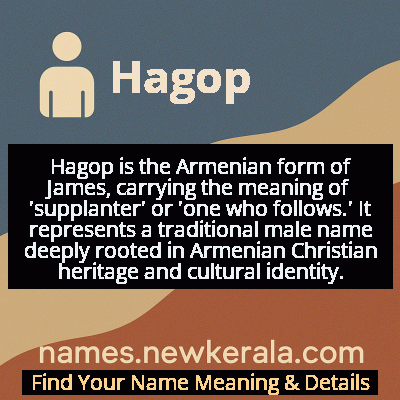Hagop Name Meaning & Details
Origin, Popularity, Numerology Analysis & Name Meaning of Hagop
Discover the origin, meaning, and cultural significance of the name HAGOP. Delve into its historical roots and explore the lasting impact it has had on communities and traditions.
Name
Hagop
Gender
Male
Origin
Armenian
Lucky Number
2
Meaning of the Name - Hagop
Hagop is the Armenian form of James, carrying the meaning of 'supplanter' or 'one who follows.' It represents a traditional male name deeply rooted in Armenian Christian heritage and cultural identity.
Hagop - Complete Numerology Analysis
Your Numerology Number
Based on Pythagorean Numerology System
Ruling Planet
Moon
Positive Nature
Diplomatic, friendly, artistic, empathetic.
Negative Traits
Over-sensitive, moody, indecisive, prone to self-pity.
Lucky Colours
Green, cream, white.
Lucky Days
Monday.
Lucky Stones
Pearl, moonstone.
Harmony Numbers
1, 3, 4.
Best Suited Professions
Diplomats, mediators, caregivers, artists.
What People Like About You
Cooperative spirit, friendliness, artistic talent.
Famous People Named Hagop
Hagop Baronian
Writer and Satirist
Founder of Armenian satire and modern Armenian comedy
Hagop Kazanjian
Architect
Designed significant buildings contributing to Armenian architectural heritage
Hagop Oshagan
Writer and Literary Critic
Major figure in Western Armenian literature and author of monumental literary works
Hagop Avedikian
Actor and Director
Prominent Armenian-French actor in European cinema and theater
Name Variations & International Equivalents
Click on blue names to explore their detailed meanings. Gray names with will be available soon.
Cultural & Historical Significance
Extended Personality Analysis
Individuals named Hagop are typically associated with a distinctive blend of traditional values, intellectual curiosity, and quiet strength. They are often perceived as deeply rooted in their cultural heritage while simultaneously possessing the adaptability to navigate modern contexts. Hagops are frequently described as reliable, family-oriented individuals who serve as stabilizing forces in their communities. Their personality tends to reflect the name's biblical origins—demonstrating perseverance, wisdom, and a capacity for leadership that emerges naturally rather than being aggressively sought. Many Hagops are known for their thoughtful approach to problem-solving and their ability to bridge generational or cultural divides. The name carries expectations of integrity and cultural stewardship, with those bearing it often feeling a sense of responsibility to uphold Armenian traditions and values while contributing positively to contemporary society. This combination of traditional grounding and modern engagement makes Hagops particularly effective as cultural ambassadors and community builders.
Modern Usage & Popularity
In contemporary contexts, Hagop maintains its status as a classic Armenian name while adapting to modern naming trends. Within Armenia, it remains a popular choice that signifies cultural authenticity and religious tradition, though it faces competition from more international names. Among the Armenian diaspora, Hagop serves as a deliberate cultural statement—parents often choose it to ensure their children maintain a strong connection to their heritage. The name has shown remarkable resilience in popularity, avoiding the dramatic fluctuations that affect more fashionable names. Recent years have witnessed a modest revival of traditional Armenian names like Hagop, particularly among third and fourth-generation diaspora Armenians seeking to reconnect with their roots. The name's usage patterns reflect broader trends in Armenian identity—balancing integration into global society with the preservation of distinct cultural markers. While not among the most common names in international contexts, Hagop continues to be instantly recognizable within Armenian communities worldwide as a name carrying historical weight and cultural significance.
Symbolic & Spiritual Meanings
Symbolically, Hagop represents the enduring thread of Armenian identity that connects past, present, and future generations. The name embodies the concept of cultural continuity—the idea that essential values and traditions can be maintained across centuries despite external pressures and changing circumstances. As a variation of Jacob/James, it carries the symbolic weight of 'supplanting' in its most positive interpretation: not as replacement but as inheritance and continuation. Hagop symbolizes the Armenian people's remarkable ability to preserve their language, faith, and culture through historical challenges, making it a living testament to resilience. The name also represents the bridge between ancient Semitic roots and distinct Armenian Christian identity, serving as a reminder of Armenia's position as the first Christian nation. Metaphorically, Hagop signifies the wisdom that comes from historical consciousness—the understanding that knowing one's past is essential for navigating the present and building the future.

